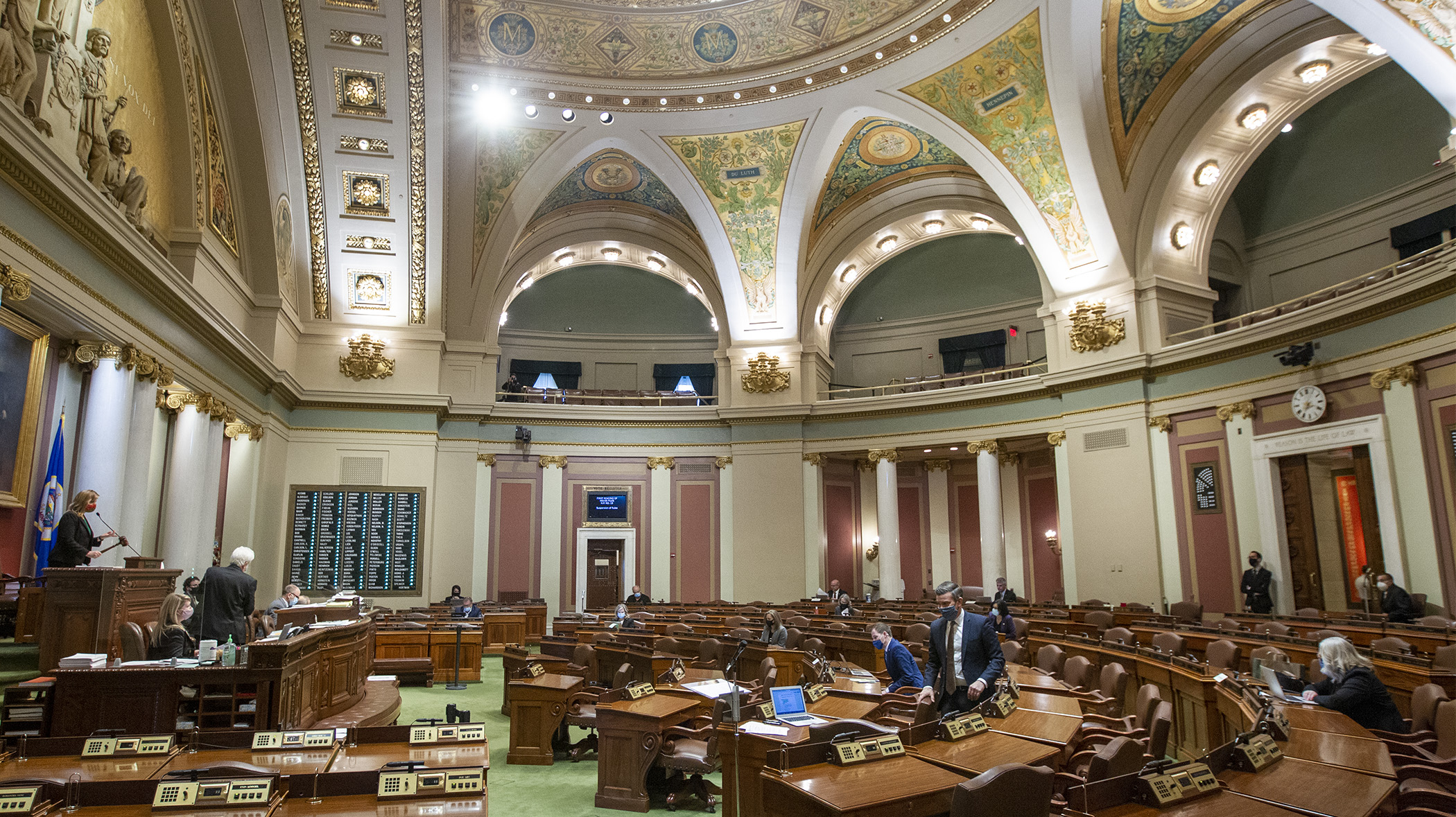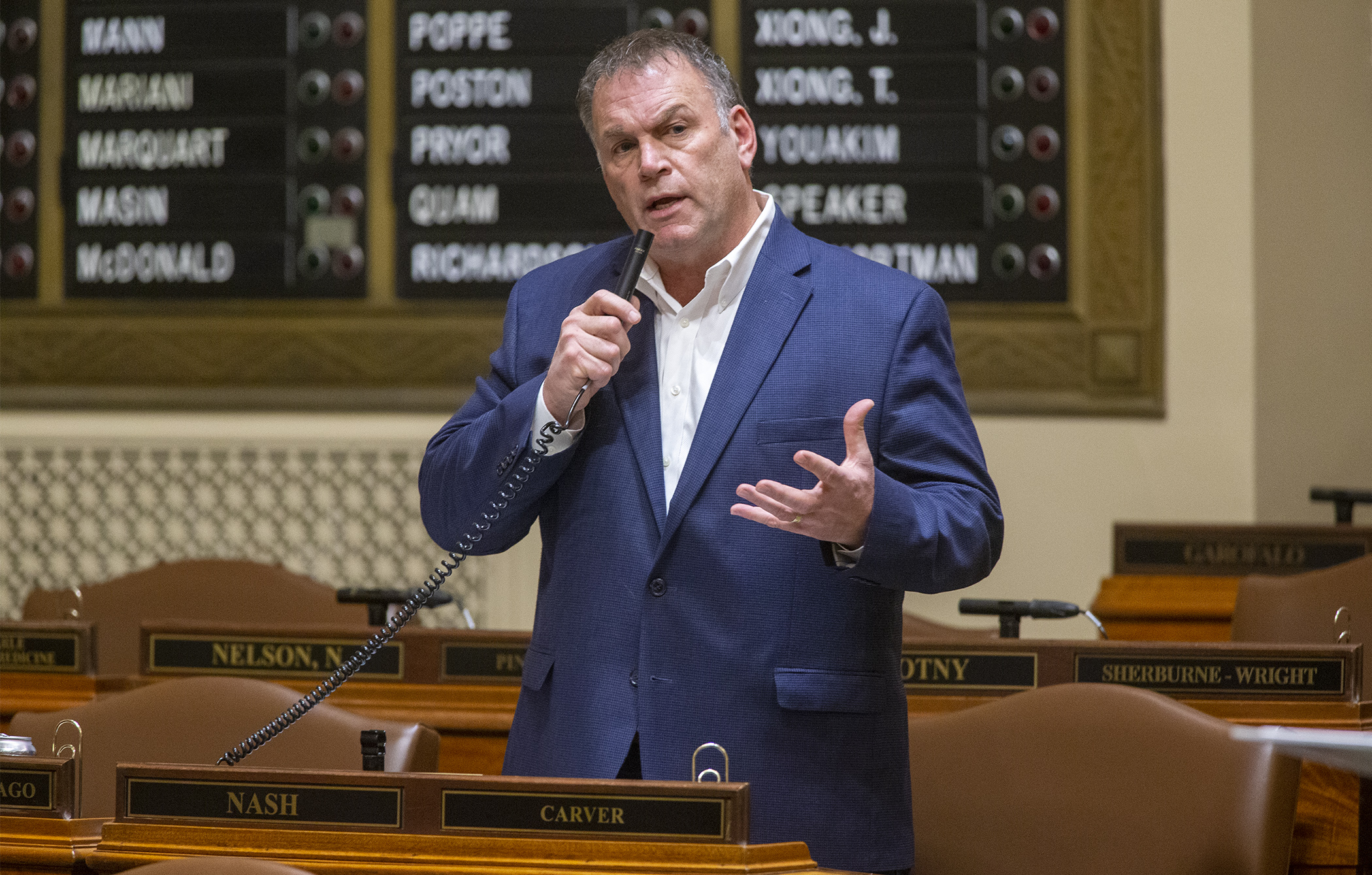House, Senate pass $216 million relief package

A signature in black ink could provide some green for business owners that have been seeing red.
The House and Senate agreed Monday on a proposal to provide $216.5 million to help businesses that have experienced a sales decline. As part of the year's seventh special session — necessitated by Gov. Tim Walz extending his emergency powers in response to COVID-19 — members also agreed on a plan to extend unemployment benefits to applicants who have exhausted all available state and federal unemployment benefits.
Following the 117-13 House vote — after 62-4 passage by the Senate a few hours prior — all that's needed is the governor's signature.
“Although we are hoping the federal government will take the kind of action they need to and provide the kind of substantial relief that Minnesotans need, we’re stepping in at this moment to provide a package that will help workers and businesses and families,” House Speaker Melissa Hortman (DFL-Brooklyn Park) said at a pre-session news conference.
“This is about people who are really hurting,” Rep. Dave Baker (R-Willmar) said at a morning news conference. “Retail stores are packed now for the holidays. There’s a lot of commerce going on and a lot of folks are just going nuts by sitting on the sideline by not being able to participate with that. And it’s causing a lot of heartburn and concern. … Today’s a good day for business relief.”
Negotiated mostly out of the public eye, and sponsored by Rep. Tim Mahoney (DFL-St. Paul) and Sen. Eric Pratt (R-Prior Lake), SSHF45/SSSF31* would provide:
- $114.8 million for counties to make grants to eligible struggling businesses and nonprofits. Each county would receive the greater of $200,000 or a per capita amount based on its 2019 population;
- $88 million to businesses that have seen at least a 30 percent decline and that provide on-site food and beverages; including bars, restaurants, breweries and wineries; bowling alleys; and fitness or sports recreation centers. Payments would be $10,000-$45,000 based on the number of employees; and
- $14 million for movie theaters and multipurpose convention centers with a capacity of at least 1,500 people. A per screen formula would be used to help movie theaters and several factors would be considered for convention center allocations. Convention center awards would need to be used for direct operations and facility upkeep.
The hope is checks will be out before the month ends; however, early-2021 may be more realistic.
“Everyone knows the faster they move, the better our businesses will be and we will save more of them the faster we get it out. Legislatively, they have to have all the money out by the middle of March, but we certainly hope it’s going to be within a matter of weeks, not months,” Baker said.
In addition, the proposal calls for the waiving of certain liquor permit fees in 2021, including a permit for alcohol sales after 1 a.m. and caterer licensing. The Metropolitan Council would refund the wastewater permit fee to brewers that produce fewer than 20,000 barrels per year. Late license renewal penalties for food retailers, food manufacturers, food wholesalers, and food brokers would be waived by the Department of Agriculture.
[MORE: Download the fiscal tracking sheet]
An amendment unsuccessfully offered by Rep. Jim Nash (R-Waconia) would have temporarily suspended certain off-sale rules to, for example, let a brewer sell the remaining beer in a tank or keg, allow a microdistillery to sell product made onsite or restaurants to sell to-go cocktails and mixed drinks.
“North of $9 million worth of beer — just beer alone — may get dumped by brewers from around the state,” he said.
Unemployment benefits extension
Minnesotans nearing their unemployment-collection cap would receive 13 more weeks of benefits, from Dec. 27, 2020 to April 10, 2021, under the bill. It would not be stacked with any future federal benefit extension, meaning the most a person can get is 13 extra weeks.
An estimated 100,000-125,000 Minnesotans are slated to lose unemployment benefits Dec. 26 without a state or federal extension.
“There are people that are running out of unemployment at Christmas,” Mahoney said. “ … It does give them certainty until winter is over. It does give them a sense of hope.”
If a federal extension is enacted, that money would replace what Minnesota does.
“We don’t have any certainty whatsoever that the federal government will ever get anything done on this front,” Hortman said.
Frustrations with governor’s COVID-19 actions
Saying the bill throws “crumbs” at business owners, Rep. Steve Green (R-Fosston) and Rep. Matt Grossell (R-Clearbrook) were among those who expressed displeasure at restrictions Walz has imposed since the pandemic began.
“Government should not be dictating to our citizens how they should be living. We should be helping them, not hindering them, and we certainly should not be driving our businesses out, driving our businesses into the dirt,” Grossell said. “… The answer is to allow these businesses to open and to take care of their neighbor. They can do it a heck of a lot better than the government can.”
Last month, Walz announced a four-week pause on social activities, in-person dining, sports and fitness establishments through Dec. 18. He was to provide an update last Friday, then today and is now scheduled to do so Wednesday.
 Rep. Dave Baker speaks in favor of SSSF31, a $216.5 million package to help businesses that have experienced a sales decline during the COVID19 outbreak. The bill passed 117-13. Photo by Paul Battaglia
Rep. Dave Baker speaks in favor of SSSF31, a $216.5 million package to help businesses that have experienced a sales decline during the COVID19 outbreak. The bill passed 117-13. Photo by Paul BattagliaEncouraging more collaboration between state leaders and the business community, Baker expressed concern businesses would have less than 48 hours to ramp back up if the governor relaxes his decision.
“It’s just maddening. We have been telling the governor, commissioners that we have to have at least seven days notice minimum to reopen a restaurant properly,” Baker said, noting, for example, the problems with getting goods and bringing employees back on short notice.
Business owners who defy the governor’s orders would be eligible for financial assistance, under the bill.
“People who decide to stay open are creating a public health problem regardless of whether they get a check from the state and that has to be dealt with on its own,” House Majority Leader Ryan Winkler (DFL-Golden Valley) said at a pre-session news conference. Civil penalties could be one penalty.
Verification would be lengthy, he said, which, in turn, would delay checks going out, possibility too late for some rule-abiding owners.
Lunch date eligibility change
The bill also extends the application deadline from Dec. 15, 2020 to Jan. 4, 2021 by which school districts must report to the Education Department the number of children eligible to receive free- or reduced-price school lunch.
This total is used to calculate compensatory revenue generated by each school site for the 2021-22 school year.
Related Articles
Search Session Daily
Advanced Search OptionsPriority Dailies
Ways and Means Committee OKs proposed $512 million supplemental budget on party-line vote
By Mike Cook Meeting more needs or fiscal irresponsibility is one way to sum up the differences among the two parties on a supplemental spending package a year after a $72 billion state budg...
Meeting more needs or fiscal irresponsibility is one way to sum up the differences among the two parties on a supplemental spending package a year after a $72 billion state budg...
Minnesota’s projected budget surplus balloons to $3.7 billion, but fiscal pressure still looms
By Rob Hubbard Just as Minnesota has experienced a warmer winter than usual, so has the state’s budget outlook warmed over the past few months.
On Thursday, Minnesota Management and Budget...
Just as Minnesota has experienced a warmer winter than usual, so has the state’s budget outlook warmed over the past few months.
On Thursday, Minnesota Management and Budget...